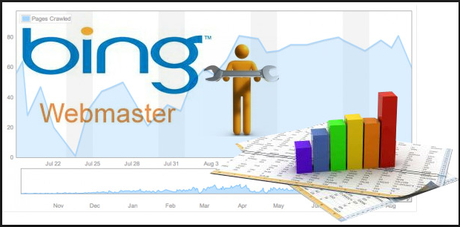
Bing Webmaster Tools is truly more advanced than Google Search Console in many ways.
After you have added your site and verified its ownership, you can access its Site Dashboard from the My Sites page. Submitting sitemap making it easier for Bing to crawl and index your site pages. It supports sitemaps in XML, RSS 2.0, Atom 0.3 & 1.0, Yahoo and Bing mRSS and Text formats.
You can control crawl rate in crawl control settings. The best rate for your site is automatically selected, but you can adjust this manually.
Disavow Links
To help maintain a natural-looking link profile, webmasters can use the Disavow feature to submit to Bing all untrustworthy or toxic backlinks to their websites.
You have the option to disavow links from a URL at the domain, directory, or individual page level. There is no option to upload a file containing all the URLs you want to disavow.
Geo-Targeting
If your target audience is in a different country from your local TLD (e.g., you are targeting German searchers with a .com domain rather than a .de), or if different sections of your website are targeting people from different countries, then you may use the Geo-Targeting feature. This feature allows you to specify the country audience for your content on multiple levels, including the domain, subdomain, directory, and page.
This is more advanced than Google, which allows geo-targeting to a country only at the website level.
Search Keywords Report
The Search Keywords Report shows which keywords from organic search are driving impressions and clicks to your website. It helps you monitor site performance in terms of click-through rates, average rank when site was clicked-through and the average ranking.
Connected Pages
Bing allows brands to associate websites with their corresponding social media accounts using the Connect Pages feature. Simply add the URLs for the specified social media accounts and select “verify.”
This is a nice feature to view the impressions and click data from your connected social media accounts in one report in the dashboard. Google lumps together all clicks from social media accounts, whether owned by you or not in one report
Page Traffic Reports
The Page Traffic report displays page-level search performance metrics for your top pages in organic search, including clicks from search, impressions, click-through rate, and more — all of which can be exported into an Excel file.
Index Explorer
The Index Explorer lets you see which pages Bing has crawled or attempted to crawl, providing data on the number of URLs that Bing has discovered, how many of those URLs appeared in search results, and the number of clicks received from search results.
To help identify potential issues, you can filter the data to only show pages with 301 redirects, pages returning 404 errors, pages with identified malware infections, and pages that you’ve excluded via your robots.txt file.
Search Keywords Report
The Search Keywords Report allows you to see which keywords from organic search are driving impressions and clicks to your website. This will show you how your site is performing in terms of click-through rates and the average ranking of your site when it’s clicked.
This is a blessing since Google Search Console reports only a sample of keywords from organic search. However the traffic from Bing is much smaller, so you will see only a limited number of keywords.
SEO Reports
SEO reports gives you recommendations to help your site abide by SEO best practices. Click on a specific SEO suggestion to view an explanation of the error and recommended course of action, and also get a list of pages that are not compliant.
Inbound Links
The Inbound Links section features the external links Bing has found that are pointing to your site. The chart gives you snapshot of links growth over time..
You will likely see only a much smaller number of links as compared to data from Google Search Console.
Keyword Research Tool
Bing allows you to perform keyword research to help establish a successful SEO campaign. With access to Bing’s keyword research data, you’ll see the query volumes for keywords on Bing and related keywords to help you develop areas to target. The keyword volume data uses organic search to understand the relative popularity of keywords. There are multiple filters that can be applied for more specific results.
Fetch As Bingbot
View your site through the eyes of Bing with the Fetch as Bingbot feature. It’s an important tool for troubleshooting errors that may be hurting your site. Just enter your URL and select “Fetch” to see how Bingbot sees your page source.
Link Explorer
The Link Explorer allows you to analyze any site’s backlink profile, which is handy when it comes to competitive analysis. You can filter this link data in a variety of ways, including by site, source (internal, external, or both) and anchor text
Markup Validator
Tool will report on any structured markup found on the page. Bingmay use the structured markup to display rich snippets for your URLs in Bing.
For those using structured markup — in this case, Schema.org, RDFa, Microformats, HTML Microdata, or Open Graph — the Markup Validator will indicate whether or not it was correctly implemented. If the markup has been applied correctly,
Here you will realize that if you used Google Tag Manager to mark up, it is not accessible to Bing!
SEO Analyzer
Analyze individual pages to evaluate SEO performance! While the SEO Reports tab is focused more on site-wide SEO issues, the SEO Analyzer looks in-depth at a single page of your choosing. The analyzer scans any URL to report if the page is in compliance with the best SEO practices, then generates a report with recommendations.
Malware
If malware has been detected on any of your pages — or if any of your pages is linking to malware — Bing Webmaster Tools will inform you of that on the Malware tab, under Security.

